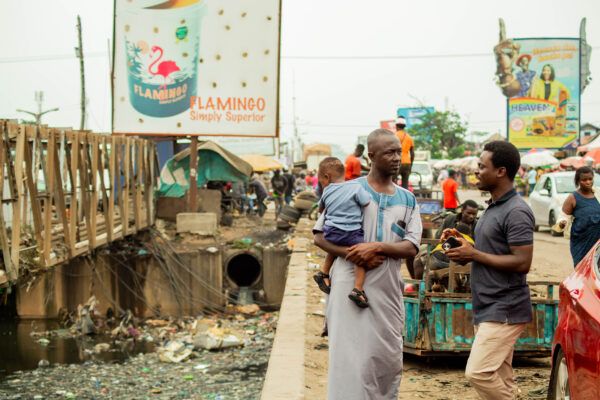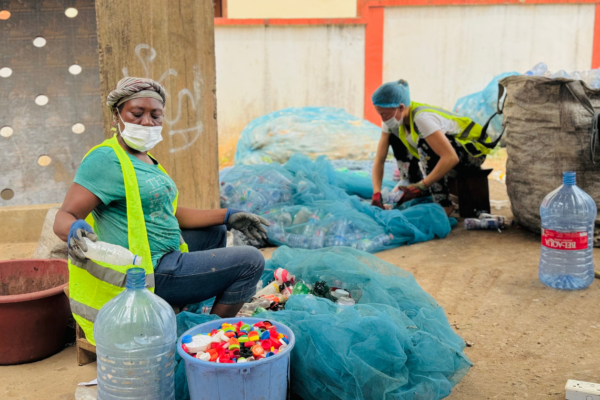Air pollution in Ghana
28,000 premature deaths are recorded every year as a result of air pollution in Ghana, according to the World Health Organization (2020). The annual average concentration of particulate matter (PM2.5) pollution in Ghana was 11 times higher than WHO 2021 recommended concentration levels in 2019. Air pollution is the second highest health risk factor for death and disability, after malnutrition. Young children and adults over 50 are most at risk of disease and premature death.
Poor air quality in Ghana is mainly caused by open waste burning, cooking using wood and charcoal, road transport, slash-and-burn methods of farming, energy generation, accidental fires and industry. While deaths from household air pollution have decreased since 1997, deaths attributed to outdoor air pollution have increased.
Ghana is one of only seven African countries with real-time air pollution monitors, but the availability and accessibility of air quality data is limited. The national government does not have a nationwide air quality policy or targets. However, there are sector-specific policies and guidelines that address air pollution, as well as clean air initiatives in Accra. Our report shows that Accra could save ~$216m from implementing clean air interventions from 2023-2040, which is about 20% of the Ghanaian government’s total health budget 2022 ($1.1 bn). Greenhouse gas emissions could be abated by 70Mt of CO2e, equivalent to ~140% of Ghana’s current annual emissions.
Like much of Africa, Ghana is rapidly urbanising and has one of the world’s fastest growing economies. Accra is Africa’s fastest growing city and is expected to grow to 9.6 million people by 2050. There is an opportunity to support policymakers and businesses to implement policies and solutions to tackle the root causes of air pollution now.
Tackling Ghana’s air pollution crisis
We’ve been supporting the clean air movement in Ghana since 2022. We engage with city and national leaders, community groups and academic institutions to better understand the prevalence and impact of air pollution, and advocate for solutions.
Addressing air pollution presents a real opportunity to tackle the unique impacts of the climate crisis in Africa, and to support an informed path to sustainable development for the continent. A locally-led and sustainable approach is enabling us to accelerate systemic change in a continent bearing the brunt of the climate crisis.
Desmond Appiah, Head of Ghana at Clean Air Fund
Green Africa Youth Organization’s Zero Waste Accra project works with waste pickers and informal workers to prevent open waste burning by removing organic, plastic and electronic waste that would otherwise end up in landfills. Afri-SET in Ghana enables the effective use of low-cost air quality sensors in West Africa through comprehensive testing, calibration and capacity building. Afri-SET ensures that policymakers, government, scientists and residents can accenss knowledge and best practices on using low-cost sensors.
The leaders of 15 municipal assemblies in Accra pledged to work with us to improve air quality in their areas in 2022. Since then, the city has joined Breathe Cities, our global urban air quality initiative with Bloomberg Philanthropies and C40 Cities. Breathe Accra’s data project established a network with 60 low-cost sensors and three reference monitors to provide real-time air pollution levels to the public for the first time. District level air quality action plans are being developed to enable effective implementation of air quality management plans.
Our partners also raise political and public awareness. New Narratives supports journalists in Ghana to investigate and report on air pollution in a way that resonates with the public and influences decision-makers. Journalist fellows have since published 128 people-centred stories, national radio programmes and podcasts on air pollution.
GhanaThink Foundation is building a movement of young campaigners to champion clean air to residents and political leaders. They teamed up with Kwame Nkrumah University of Science and Technology run youth-focused workshops across Ghana’s 16 regions and two summer schools on air pollution prevention over two years.
Image: The site of Afri-SET’s monitoring station at the University of Ghana in Accra. Credit: Prince Kuaranchie

